The New Zealand Law Society has enjoyed a fastish start to 2025. It has submitted on two pieces of proposed legislation, the Principles of the Treaty of Waitangi Bill and a discussion document on a proposed Regulatory Standards Bill. ACT Party leader David Seymour has promoted each.
This piece focuses on the Law Society’s crap submission on the Principles of the Treaty of Waitangi Bill. But, make no mistake, its submission on the Regulatory Standards Bill discussion document is also just anti-Seymour ideological claptrap.
Housekeeping
Neither submission begins well, each beginning “The New Zealand Law Society Te Kāhui Ture o Aotearoa (Law Society) welcomes the opportunity to…”. The Law Society appears not to know its own name, which - under the Society’s own legislation - is simply the New Zealand Law Society.
Neither submission begins well, each beginning “The New Zealand Law Society Te Kāhui Ture o Aotearoa (Law Society) welcomes the opportunity to…”. The Law Society appears not to know its own name, which - under the Society’s own legislation - is simply the New Zealand Law Society.
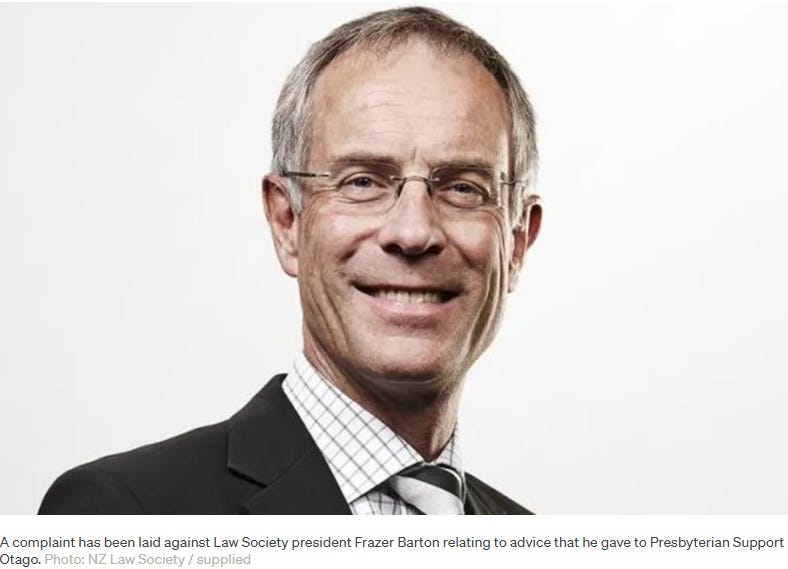
Click to view
And the discerning citizen may wonder about why neither submission is signed by the notional head of the Law Society, “President” Frazer Barton. (The Law Society’s submission on the Treaty Principles Bill is signed by “Vice-President” Jesse Savage, with the submission on the Regulatory Standards Bill discussion document signed by another “Vice-President”, David Campbell. Four of the seven current Law Society board members are “Vice-Presidents”; it’s all strangely Corporate American.)
So, what’s happened to President Frazer Barton? The Law Society’s website describes him as “taking a leave of absence” and says Frazer simply “does not wish the ongoing public interest in his previous governance role at Presbyterian Support Otago to be a distraction”. Well, Frazer is gardening - or whatever - because of a particular finding contained in the Royal Commission of Inquiry’s Report into Abuse in Care.
With the Inquiry looming, Fraser, as a practising lawyer and chairperson of the Presbyterian Support Otago (2014-2018), advised Presbyterian Support Otago’s chief executive that she could legitimately arrange the destruction of all records of children and young people that it had “cared for”. And, fortified by Frazer’s comforting advice, the chief executive duly destroyed all such records. It was this deliberate, wholesale destruction of evidence that the Inquiry found made its investigation into abuse at Presbyterian Support Otago “particularly difficult”. Bad boy, Barton.
Submission on Treaty Principles Bill
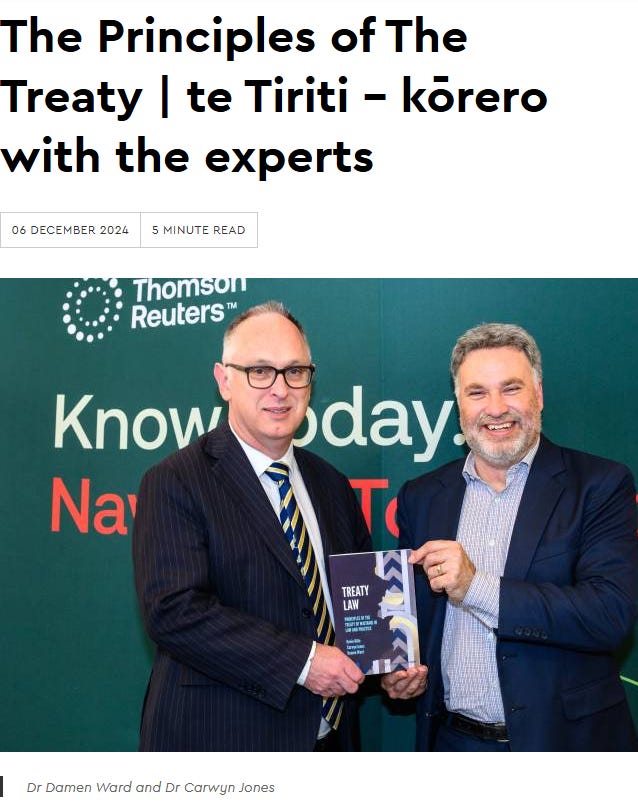
Click to view
The Law Society’s submission on the Treaty Principles Bill is about as far away as one can imagine from comprising considered, reasoned legal points on the Bill. It’s a polemical rant against proposed legislation that activist officers at the Law Society, for their own ideological reasons, simply hate.
You can read the submission for yourselves Principles-of-the-Treaty-of-Waitangi-Bill-07-01-25.pdf. But let’s examine some of the more extreme, illustrative and misguided pot shots that the Law Society aims at the Bill, mainly through the prism of the alleged Treaty of Waitangi “Partnership Principle”.
Partnership Piffle
The Law Society’s submission contains multiple references to the - invented and incoherent - “partnership” principle of the Treaty of Waitangi:
…the Bill…uses general language to equate the rights of ‘everyone’ with those of Treaty partners [what does that even mean?]Courts of general and specialist jurisdictions have also developed a body of jurisprudence about the Treaty principles, which has tended to emphasise three interrelated and overlapping Treaty principles: partnership, active protection and redress.The Law Society notes that the Treaty principle of partnership has always recognised that the Crown has the right to govern and make laws, but the ‘legitimacy’ of that right is qualified in recognition of the peaceful settlement of Aotearoa te Tiriti/the Treaty as an agreement between the Crown and Māori
The Law Society also observes that proposed principle 1 was not drafted in consultation with Māori, the Crown’s Treaty partner.
It uses general language to equate the rights of “everyone” with the rights of hapū and iwi, who are a Treaty partner to the Crown.
However, the process for making that change has simply involved the Crown introducing the Bill to the House without any prior consultation or engagement with Māori (the Crown’s Treaty partners), or any experts (such as constitutional experts and pūkenga), and ultimately leaving the decision of whether to enact the Bill in the hands of the general public (who would need significantly more information and time to be in a position to make a decision that significantly affects New Zealand’s constitutional arrangements, and which has both social and legal consequences).
Meaningful consultation with Māori is important in the context of these reforms because the current principles place an obligation on the Crown to consult its Treaty partner on constitutionally significant reform proposals.
Presenting Māori with a predetermined decision, or a ‘fait accompli’, would be inconsistent with the ‘spirit of the partnership which is at the heart of the principles of the Treaty’, and seen as a failure to act in good faith towards Māori.
By asking the public to determine Treaty matters through a referendum, the Crown risks imposing the will of a non-Māori majority on its minority Treaty partners (who are the ones who will be most affected by these proposed reforms)
What general comments can be make about this “Treaty partnership” fixation?
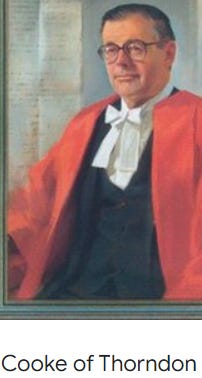
For starters, like the origins of many culty belief systems, the “Treaty Partnership” article of faith stems from a peripheral – almost throwaway - line from a person ill-equipped to pronounce authoritatively on the subject. The line came from judge Robin Cooke, in a 1987 Court of Appeal decision in New Zealand Māori Council v Attorney-General. The eccentric, activist judge stated that the Treaty of Waitangi created "an enduring relationship of a fiduciary nature akin to a partnership" between Māori and the Crown. Without no credentials as a historian, Cooke was unqualified to pronounce that the Treaty of Waitangi created anything even “akin” to a partnership. Unfortunately, just occasionally, off beam ideas malignantly metastasise.
Any Crown-Māori partnership would necessarily require a conception of “Māori” as a unity with a singular legal personality. Such a conception is of course a fantastical abstraction, one involving a significant degree of racial stereotyping, assuming as it does that there’s a group of people with varying degrees of Māori ancestry all of whom share some amorphous common belief system (the mystical “Māori word view”).
WHO IS MĀORI?
John McLean
·
15 December 2023

It’s not clear why the question “Who is Māori?” is not allowed to be asked in politically correct circles. Perhaps it’s because the question might be construed to cast aspersions on the significance or strength of individuals’ Māori ancestries or “identities”. Perhaps the answer to “Who is Māori?” is too tricky to find or contemplate. Or, in racially ch…
Read full story
The Māori unity myth necessitates an insidious denial of the individuality, and the cultural straight jacketing, of people with Māori ancestry, together with ostracizing those individuals with Māori ancestry who do not fit the strict doctrinal mould. It’s what allows Wokesters and Te Tiritists to refuse to acknowledge David Seymour’s pride in his Ngāpuhi heritage and to stead label him a Not-a-Real- Māori, Nazi Racist. Central to the Law Society’s submission is the fair question “Who is Māori”, but in Woketearoa simply asking that valid question is racist.
Because the notion of a Crown-Māori partnership would necessarily require a separate race-based Māori unity, appeals for the realization of a Crown-Māori partnership are necessarily separatist, involving radical constitutional revolution. Superficially benign appeals to a “Crown-Māori” partnership are, in essence, a polite way of calling for the reconstitution of New Zealand along strict racial lines, or the even more outlandish notion of “decolonisation”.
GLAZEBROOK
John McLean
·
9 September 2024

The Honourable Dame Susan Gwynfa Mary Glazebrook is one of New Zealand’s most powerful and corrosive people. Glazebrook is an arch activist judge on New Zealand’s highest court, our Supreme Court. She’s even got to stand in as New Zealand’s Governor-General when Governor-General Dame Cindy Kiro, in a rare burst of devotion to duty, attended the funeral …
Read full story
And this thinking is not confined to the margins. In her 2021 speech The Rule of Law: Guiding Principle or Catchphrase? current Supreme Court Judge Susan Glazebrook stridently announced:
So, what does all this say about Aotearoa and the rule of law? I would suggest that, until we complete the process of decolonisation, the rule of law can only be considered a work in progress.
In her speech, she fawningly references fellow Supreme Court Judge Joe Williams, in the following terms:
See Williams, above…for a discussion of decolonisation. It has been suggested that at a fundamental level, decolonisation involves the taking back by indigenous people of power and control
The indigenising of legal education and our universities will have a major part to play in decolonisation: see generally Joe Williams “Decolonising the law in Aotearoa: Can we start with the law schools?
Glazebrook, Williams and their ilk are fanatics who mean it when they say they want to destroy New Zealand’s current constitutional arrangements. It’s a bit like when Russian President Vladimir Putin said he’s going to invade Ukraine. You ignore these types at your peril.
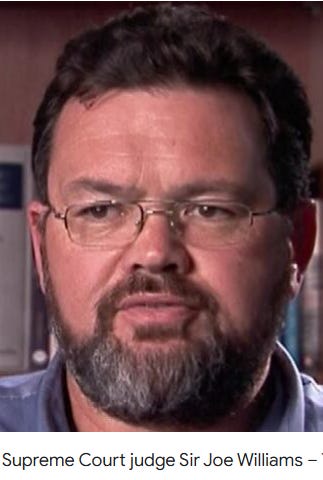
So, what can we do about the likes of insurrectionist judges Glazebrook and Williams? Unfortunately, not much. Glazebrook will reach the mandatory retirement age for New Zealand judges (70) in February 2026. But Williams is much younger and there’s every indication that all our other Supreme Court judges are fellow Te Tiritists.
Until quite recently, Glazebrook and Williams would have been guilty of the crime of sedition, which included:
Bringing into hatred or contempt, or exciting disaffection against, the Government of New Zealand, or the administration of justice
Exciting such hostility or ill will between different classes of persons as may endanger public safety
But New Zealand’s Parliament removed sedition as a crime on 1 January 2008.
The Law Society’s submission against the Treaty Principles Bill puts much store on the “uncertainty” that the Bill, if enacted, would inject into matters relating to the Treaty of Waitangi. Which is all richly ironic and hypocritical given that there is no sphere of New Zealand’s constitutional and legislative arrangements that is more fraught with uncertainty that the alleged “Treaty Principles”. And that’s exactly how the elite judiciary, Waitangi Tribunal and other travelers on the Race Gravy Train want it to remain.
The Law Society’s submissions against the Treaty Principles Bill are heavy on an alleged lack of consultation with “Māori”. But consultation with who, or which Māori, exactly? Presumably not David Seymour, or Winston Peters, or Shane Jones, or even the recently deceased Māori King Tūheitia who in his last speech at the Turangawaewae Marae said “There’s no principles, the Treaty is written. That’s it.”
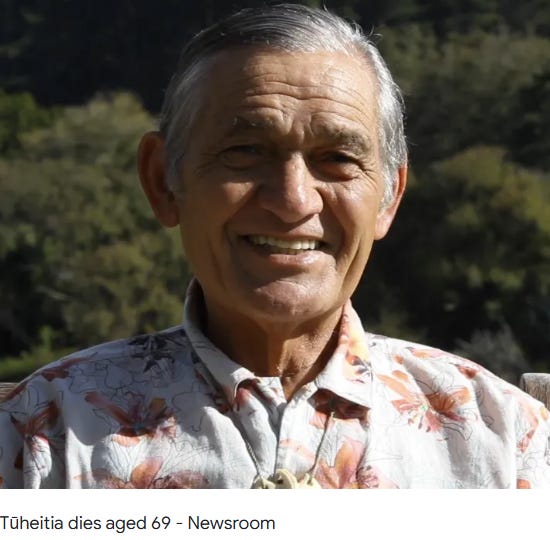
Perhaps the Law Society wishes to see Joe Williams anointed as Aotearoa’s sole oracle and authority on Things Māori. But we know, don’t we…any purported consultation would be with the Aotearoa’s legion of well remunerated race hustlers, grifters and racketeers; many of whom – like Karen Feint KC - organiser of the Kings Counsels’ letter to the Government which pompously culminated with “We call upon the Prime Minister and the coalition government to act responsibly now and abandon the [Treaty Principles] Bill” - have not one scrap of Māori heritage.
The reality, of course, is that the Law Society doesn’t want any consultation at all on a Treaty Principles Bill that – let us remind ourselves – is going nowhere because Luxaflex, the blind (one-term, if that) Prime Minister, has pledged that his National Party will not support the Bill beyond its first reading in Parliament.
Given the constitutional significance of such an exercise, it should also involve consultation with constitutional experts, pūkenga and the broader public to understand their views, and include an assessment of the costs and benefits of such an exercise informed by engagement with affected groups. The Law Society has not seen any persuasive argument that such an exercise is necessary or constitutionally appropriate at this time. [Emphasis added]
What the Law Society Sophistrists, Waitangi Tribunal, Supreme Court and other Te Tiritists are really saying is…We’ve invented all these amorphous, ahistorical, undemocratic Treaty Principles, we’re mightily proud of them, they pay well and the prospect of the New Zealand Parliament defining them is abhorrent to us. So what?
Under its legislation, the Lawyers and Conveyancers Act, “The representative functions of the New Zealand Law Society are to represent its members and to serve their interests”. I wonder what proportion of the Law Society’s members think their Society is truly representing them, and serving their interests, with its extreme political biases. In reality, a coterie of Wokesters and Critical Race Theorists have hijacked the New Zealand Law Society and are using it to prosecute their own ideological bents.
The Law Society is therefore being driven well outside of its proper lane. A sovereign New Zealand Parliament can, by passing legislation, legitimately change…anything. In a true Parliamentary democracy, nothing is sacred. There’ll of course always be good legislation and bad legislation. But the notion, espoused by New Zealand’s very own national Law Society, that it’s illegitimate for Parliament to even consider passing some laws is antidemocratic drivel.
John McLean is a citizen typist and enthusiastic amateur who blogs at John's Substack where this article was sourced.


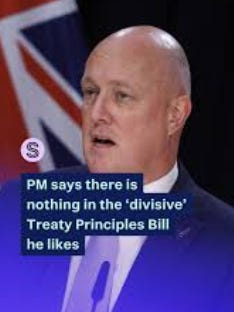
19 comments:
John. A very good article, thank you. I was once a practicing lawyer but, thankfully, am now well past that period of my life. I note that that once august society is heavy on the lack of consultation with so-called Maori (very one-sided) but would appear not to have consulted its own members with regard to their views on the bill. It may be a forlorn hope, but it would be nice to think that the average lawyer will remember this when next voting for the society’s officers.
"In reality, a coterie of Wokesters and Critical Race Theorists have hijacked the New Zealand Law Society and are using it to prosecute their own ideological bents." Thanks for this John - I hope you're right - I need a new lawyer, and I feel so leery of the whole profession these days, I hesitate to make any approach.
Frazer Barton is the sort of lawyer i would prefer.The problem for we common folk is to find out the abilities and attitude of potential legal reps. Presumably his principles such that he commented to Presbyterian Services in a manner likely not to maximise future employment for the profession; a display of integrity rare ineed in the law professiLn/industry./racket. Hardly an attitude appropriate for the Law Society.
What will be interesting is whether the Law Society submission is chosen to be spoken to at the Select Committee. A representative submission without specific OK from all members is tantamount to fraud, at the very least a Misfeasance /Malfeasance of Justice or deliberately Misleading Parliament.
It would be magnificent for the general public to have the opportunity to take the whip to errant legal fraternity through the court system.
“The line came from judge Robin Cooke, in a 1987 Court of Appeal decision in New Zealand Māori Council v Attorney-General”.
The 1987 Court of Appeal between the NZ Maori council and the Attorney General stated, “The Treaty of Waitangi has been primarily interpreted in the NZ Courts and this appeal was significant in establishing the modern views on the Principles of the Treaty”. This same Court also confirmed the treaty was a Partnership between Maori and the Crown.
On page 663 of the Appeal document, we find that instead of using the original Maori language treaty text, this Court used an unauthorized text by (conflict of interest) Mr Kawharu, which he calls his “attempt at a reconstruction of the literal translation of the Maori text”. (This of course, differs from the 1869 official back translation of the original Maori language text)
The Court stated, “It was put before us on behalf of the applicants” and the Crown likewise accepted it for the purpose of this case. (how convenient)
Here we have the Crown accepting a bogus translation to interpret the treaty and establish the unfounded ‘Five Principles of the treaty’ and a ‘Partnership between Maori and the Crown’.
Taken from the Government website is the “official English treaty version” being used since 1851 (Freemans false, fake fraud), the “modern English translation of the Maori treaty” (Kawharu’s attempt) and “footnotes” to his attempted translation (manipulation)
https://nzhistory.govt.nz/sites/default/files/documents/treaty-kawharu-footnotes.pdf
To those who are familiar with the original Maori language treaty text, Busby’s final draft and the official 1869 back translation of the original, will see how we have been royally screwed over by the collusion of ‘out of order’ courts and ‘out of order’ governments using 'out of order' documents.
Yes.
You have clearly shown us who and where is the Enemy Within !!
In New Zealand today, what is a Maori ?
We have plenty of these fake "natives" here in NZ.
For example:- 45% English blood, 35% Chinese blood, 20% Maori blood.
HELLO !! That makes me a Tangata Whenua !!!
I am no Lawyer but it seems to me the Society's whole case is based upon the false perception of a "treaty" between the Crown and "Maori". The TOW was signed by ONE representative of the Crown (of the British Commonwealth) and some 520 or more individual, disparate, often warring, tribal Chiefs. There was no united sovereign "Maori" state and therefore no one individual representing "Maori" to sign a partnership deal, even if one was ever practical, possible or contemplated (It never was). As David Lange said, you cant have a partnership and democracy simultaneously.
Doug, Canada has a blood proportion system for extra rights.
So did we until the 70s.
Why did we ever abandon that ?
A smart government would reestablish that - never with Luxon in charge.
He is hopeless as a leader and will remembered for what he wouldn't do for NZ.
Thank you, John. This would be hilarious if it wasn't so serious. What is a Maori? We have those in parliament that cannot tell what a woman is! It reminds me of the words of George Burnard Shaw, poet and author, when talking about some character (or other) said: "He thinks he knows everything. He knows nothing. He's obviously destined for a career in politics".
What is a Maori? We had one politician who, when asked, stated that "If you think you are Maori, you are Maori!" We had another who did not know what the three paragraphs of the treaty were about!
Not one wordsmith from the judiciary, universities, or parliament, can tell me what the partnership or the principles in the Treaty of Waitangi are. Charming!
Kevan
Once the definition of a Maori person needed to prove at least 50% or more Maori blood.
Now anyone can claim to be Māori.
Simple reality, there exists no such creature as a complete Maori.
A political collective based on race cannot exist in a working liberal democracy.
Regardless of anyone's interpretation of the Treaty, it is irrelevant to the modern world we all find ourselves.
Commiserations ?? (add smiley emoji)
If we put a competent engineer in charge of all this, he/she (there are only those two options) would look at all available evidence, apply logical reasoning and determine that the NZ populace has indeed been screwed over, and right royally so! A similarly competent Government would use said logic to immediately correct the Treaty of Waitangi Act to refer to the only viable/credible English wording (the Littlewood draft from whence the matching Maori text ensued). It would also remove ALL references to the nebulous principles and save New Zealand from the blood sucking grifters who would take the Country down the proverbial. Finally, it would reinstate the crime of sedition to the relevant Act and give us all relief from the Marxist forces that are blighting our lives. I promise I will wake up now ... A N Other Engineer (retired).
For sure yes - in fact Duncan Webb may request it!
Over the years I have made submissions to various bodies on various topics. I have often copied my submission or otherwise endeavoured to rouse interest by other parties. But it is very difficult. The route from secretary to ordinary member is tortuous and the establishment of and response to any reaction even more so. In effect I was just communicating with the secretary and their private view, which may be totally at odds with their organisation majority if they had been informed. (For obvious example, a modern indoctrinated trace maori or similarly sympathetic secretary would be unlikely to fully disseminate information or record responses not pro the maori self interest view) Often senior positions in volunteer organisations are occupied by persons with connections far from commercially disinterested, and this influences info made available to members. The organisation's "official" response may have involved little or no consultation with members. Some years ago I was interested in the Auckland Regionl Parks management plan. A senior executive of one of the major volunteer groups most affected was commercially associated with aspects of track monitoring..... I doubt if my proposed submission provided to them and very relevant the ordinary member was circulated. Recipients of submissions should treat all on logical reasoned merit but that not practicable (and beyond the ability of many on review panels).
Overreach of mandate.
Local councils are doing the same. e.g. The Auckland CC made a submission on the ACT TP Bill - this passed by 11 votes out of 20.The Mayor was not present. This submission opposes the Bill, implying that this is the view of all Auckland ratepayers and residents ( nearly 2 million people - 40 % of NZ). No consultation took place to represent these persons.
A complaint has been made to SC Chair James Meager to disregard the submission as " misleading and unauthorized."
Let’s adopt the Hawaiian King’s native definition, requiring 50% native blood. Thus there are no no Maori in NZ. Problem solved. Gravy train derailed.
What sort of union akin to a partnership is it if one partner wants separate rules, demands overriding decision-making power, insists on doing things according to their religion, desires and works towards different rights and treatments than the other; one that counts the wrongs of the other and stamps their feet if they do not get their own way? Then this is an abusive relationship or a mutiny. It is not a union that is: patient, kind; that does not envy, that does not boast, that is not proud; that does not dishonour others, that is not self-seeking, that is not easily angered, that keeps no record of wrongs; that does not delight in evil but rejoices with the truth; that always protects, always trusts, always hopes, always perseveres.
Post a Comment
Thank you for joining the discussion. Breaking Views welcomes respectful contributions that enrich the debate. Please ensure your comments are not defamatory, derogatory or disruptive. We appreciate your cooperation.